Informationwar technique - Retaining What You Learn So You Can THINK Instead of Parrot
Today, I'll be going through this Will Schoder Youtube video, How To Remember Everything You Learn. Will's central point is that we have a modern tendency to think we know what we are talking about, but instead, what we are doing is parroting other people's opinions!
Let's not be NPCs, mmmmmkay.
So as I walk through the video, I'll stop and delve a bit further into the material that I think is relevant...pro-tip, after you watch the video and read this blog, go ahead and watch the video again, and see where I was wrong in terms of relative importance...you may have a different take on what works for you better than I do!
That's called thinking ;>
I tricked myself into thinking I was learning something
Illusions of Competence
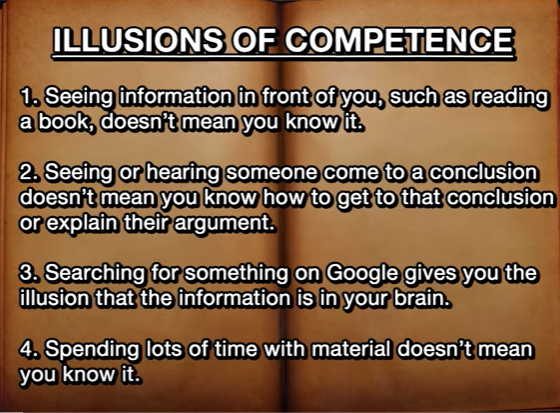
Basically, having information available to you does not mean you understand the material!
Barbara Oakley has an interesting and highly educated background
Professor Oakley participates in several areas of research. These include STEM education, engineering education, general learning, online learning, MOOCs and their effects, and studies of empathy and altruism.
Wiki
She has also written a book which we might find useful in informationwar research, Evil Genes, her "what Oakley considers gaps in psychological research surrounding "successfully sinister" individuals — those who show subclinical symptoms of personality disorders, and who are often found in positions of authority in politics, religion, business, and academia."..
each of these ruthless dictators shared a similar devious expertise in manipulation and control.
Amazon link to Evil Genes
Finally, if you are still in school, or perhaps preparing to take professional exams, Dr. Oakley provides A through checklist for taking tests!
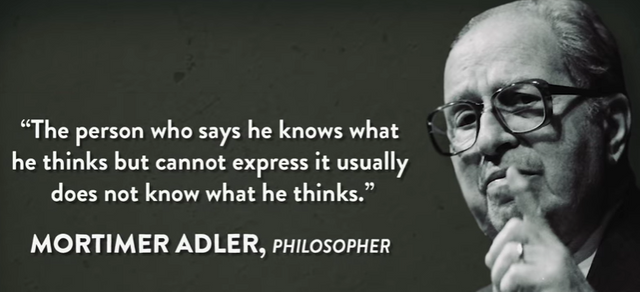
The difference between "feeling informed", and truly understanding it
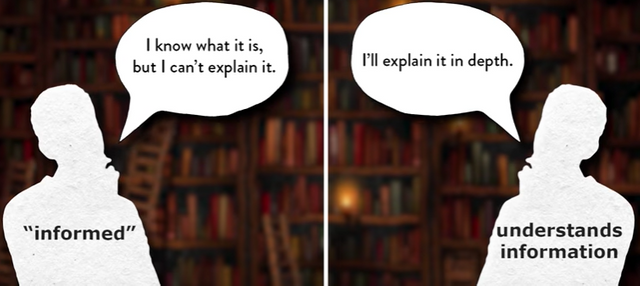
My immediate digression, and a very important point...the person who tells you "I will explain this in detail" may insert his bias in place of detail. This is covered in the video, but it should be noted as a high priority in what you are taking from this video. Again, the basic point of the video is that YOU should be working towards understanding through real knowledge those things that are important to you
sooo...what are we explaining?
- Why something is the case
- What are it's connections to other facts and theories
- It's place in context
Schoder notes that
media today packages everything so that thinking for ourselves is obsolete.
Well, at least that is their goal. Media is in the informationwar business, not the information business. YOU decide whether you are going to use your brain!

But HOW to learn?
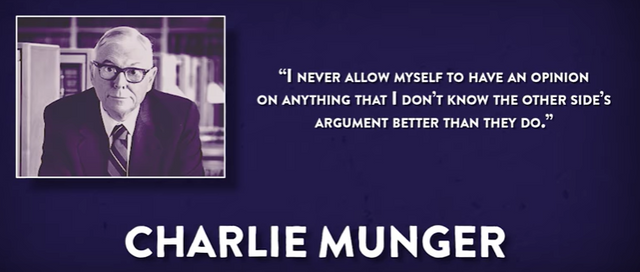
Leftists get mad when I distill leftism down to bashing in people's heads and stealing their property...but whatever rhetoric they use, history shows this is what leftism always comes down to... : I know their ideology better than they do
From the video
like anything else I want to do that involves getting better, there is a lot of work involved
- Do a lot of reading
- Listen to argument on the subject
- Argue with smarter people (who may be wrong, but have an argument that itself leads to a deeper understanding)
- Consider as many variables as possible
- UNDERSTAND PERSONAL BIAS! Yes, I highlight this ;>

AHA, but we return to a point made earlier in the video...information overload (AKA analysis paralysis); the video explains this in terms of failing to take in any information when our short-term memory is overwhelmed with new information before it is processed into long term memory or intellectual understanding.
How memory works
The two main areas of memory:
- Short term memory, which acts as a gateway to long term memory
- Long term memory, which not only stores facts, but stores schema, or patterns of knowledge
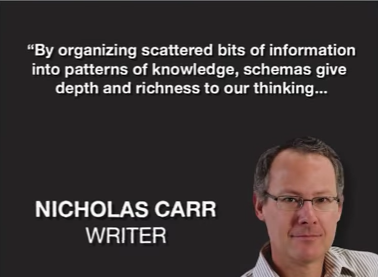

Carr writes regarding technology and culture. The quote is from The Shallows: What the Internet Is Doing to Our Brains (2011)Amazon link to book, and the book addresses this memory filter problem.
Schoder suggests that the relationship between time and amount of schemas is like an investment plan into understanding...as the number of schemas in your long term memory accumulate, they gather "compound interest" in understanding
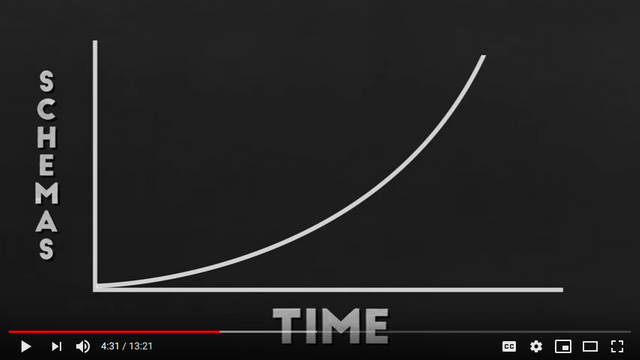
...and that they begin to connect to each other...
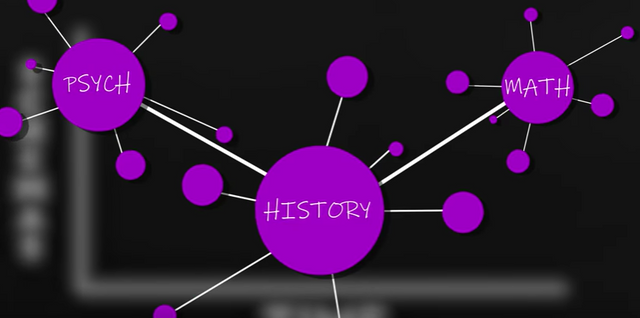
[Start digression now...]
Personally, I was happily reminded of a chart I drew almost 25 years ago (recreated here) to help a trainee understand that while complex material can be daunting at first, over time and learning, it will all come together.
Consider the area in black as ever expanding areas of knowledge, as they connect, you get full understanding...

So first you identify which areas to study(those outlined in black), then you study (filling those areas up with knowledge), and finally you have understanding as areas of knowledge converge! For now, let's just envision these four areas as mathematics, geology, geography, and earthquakes. In this example, you would have a better understanding of predicting where earthquakes will happen as your knowledge expands to intersect the area!
[End digression here...Back to the video]
The point at which short term memory clogs up as a gateway to long term memory is working memory. As discussed, overload it's capacity, and you learn NOTHING.
The gateway then becomes a bottleneck (or a stovepipe, a term often used in intelligence analysis)...
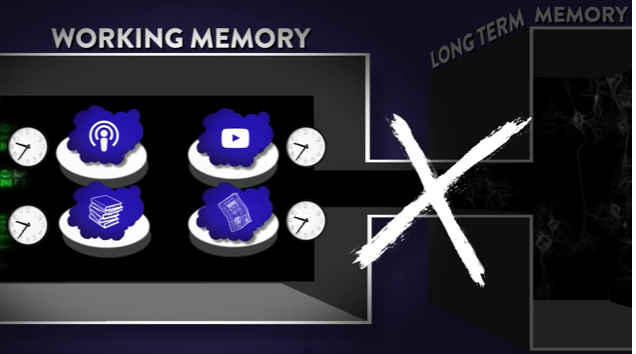
Schoder now moves to the problems that multi-tasking bring to learning. I'll note this and move on, because IMO this should be obvious...the basic is that task shifting overloads working memory just as effectively as information overloading does.
Starting the Learning Process
Start by eliminating these habits from your workflow
- Information overload
- Distractions
- Multitasking
Focus on the task at hand!
Retaining One Source At a Time
Schoder explains three methods to accomplish this
- Recall
- Feynman Technique
- Spaced Repetition
Recall
After you read (or take in information by other means), look away...and see what you can remember from it. This has proven memory retention ability.
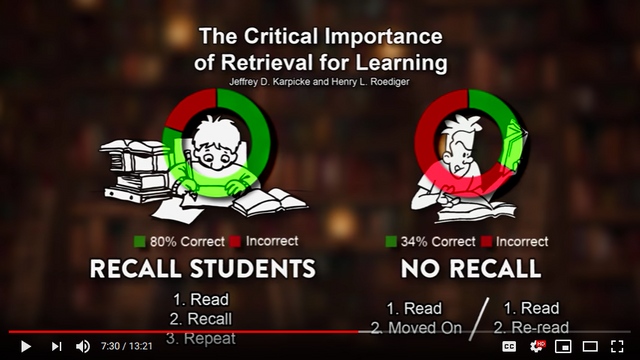
And while our tendency is to move on to the next chapter, or the next Youtube video, Schoder argues that as little as 30 seconds engaged in recall will aid the transition from short term memory to long term memory.
The Feynman Technique
In his 1974 Caltech commencement address, Richard Feynman made the following statement;
The first principle is that you must not fool yourself, and you are the easiest person to fool
Source - https://strategyumwelt.com/frameworks/feynman-technique
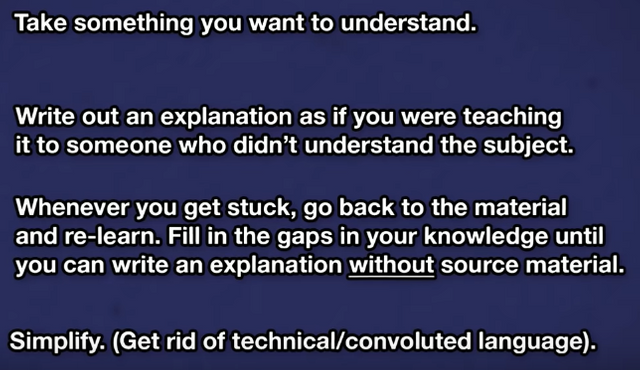
This goes beyond just taking notes as you study; it is an improvement on the idea of rewriting something to retain it in memory.
This can summarized as an ELI5 (explain it to me like I was 5) process.
Schoder also recommends the use of analogies in the The Feynman Technique, and uses two examples from within his video:
- The time investment explanation
- The bottleneck from short-term to long-term memory
Finally, Schoder points out that is both the best way to retain information, and the most work-intensive!
Spaced Repetition
People assume that the brain works like a computer, with accurate information retrieval. Schoder contends that the brain works more like a muscle. Coming from a criminal justice background, I can attest to the amount of research done in proving how fallible human memory can be.
Neurons that fire together, wire together
LOL, I like that one ;>
But you have to USE your brain if you want it to work at peak efficiency (reminds me, 2 1/2 weeks since I been to gym...derp)
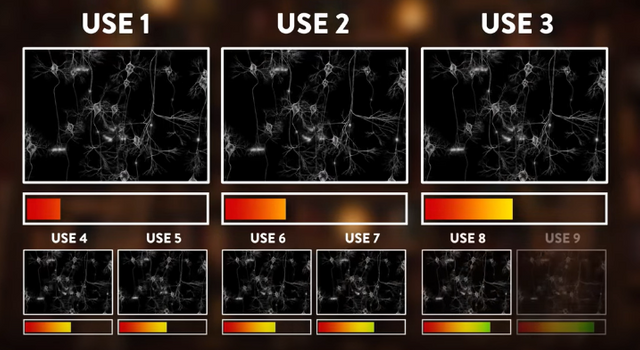
The point here is that the material has to be gone at ...repeatedly...and over time...to process it fully.
ALL of these methods require WORK
Thinking is hard...reading the same material over and over again is boring...we don't have a lot of time to begin with.
And it has ALWAYS been so...one of the reasons that we evolved the use of heuristics (thinking shortcuts that when used improperly become cognitive biases) is precisely because thinking is hard and uses our personal resources.
Schoder return to the point that we allow media to fill this information gap for us.
However, he ALSO makes the point that life is not a book report...you do not need to analyze everything that life puts before you. But you do need to do this with anything that is IMPORTANT to you!
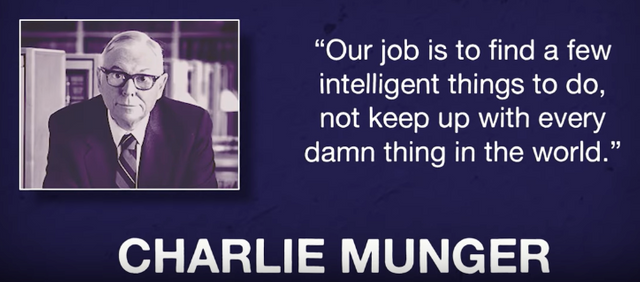
Intellectual Humility
There is so much trivial knowledge, so much prepackaged "information" out there, and so many different viewpoints, that we CAN NOT KNOW everything.
We don't just derive our views from our biases, but we often then attach our self-image on our views!
So never stop learning, and never stop sussing out your own bias.
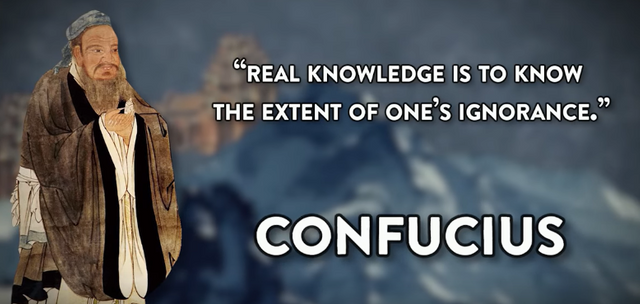
Follow my curation trail, More Info


My Books

Join our @informationwar Curation Trail
- Our purpose is to encourage posts discussing Information War, Propaganda, Disinformation and other false narratives. We currently have over 9,000 Steem Power and 40+ people following the curation trail to support our mission
- Tutorials on all ways to support us and useful resources here
- My INDEX of informationwar writing




Hi @stevescoins!
Your post was upvoted by @steem-ua, new Steem dApp, using UserAuthority for algorithmic post curation!
Your UA account score is currently 5.552 which ranks you at #543 across all Steem accounts.
Your rank has dropped 1 places in the last three days (old rank 542).
In our last Algorithmic Curation Round, consisting of 253 contributions, your post is ranked at #56.
Evaluation of your UA score:
Feel free to join our @steem-ua Discord server
Great posts as always!
Upvoted and resteemed!
Curated for #informationwar (by @truthforce)
Our purpose is to encourage posts discussing Information War, Propaganda, Disinformation and other false narratives. We currently have over 9,500 Steem Power and 40+ people following the curation trail to support our mission.
Join our discord and chat with 250+ fellow Informationwar Activists.
Join our brand new reddit! and start sharing your Steemit posts directly to The_IW, via the share button on your Steemit post!!!
Connect with fellow Informationwar writers in our Roll Call! InformationWar - Leadership/Contributing Writers/Supporters: Roll Call
Ways you can help the @informationwar
muchas gracias! I'll be moving more in this direction for my IW stuff. yall have a current Discord invite link? I was using an old one
https://discord.gg/4c8Mpn8
Also meeting today if you are able to attend :)
https://steemit.com/informationwar/@informationwar/informationwar-meeting-sunday-6pm-cst-7pm-est
I'll try to get set up